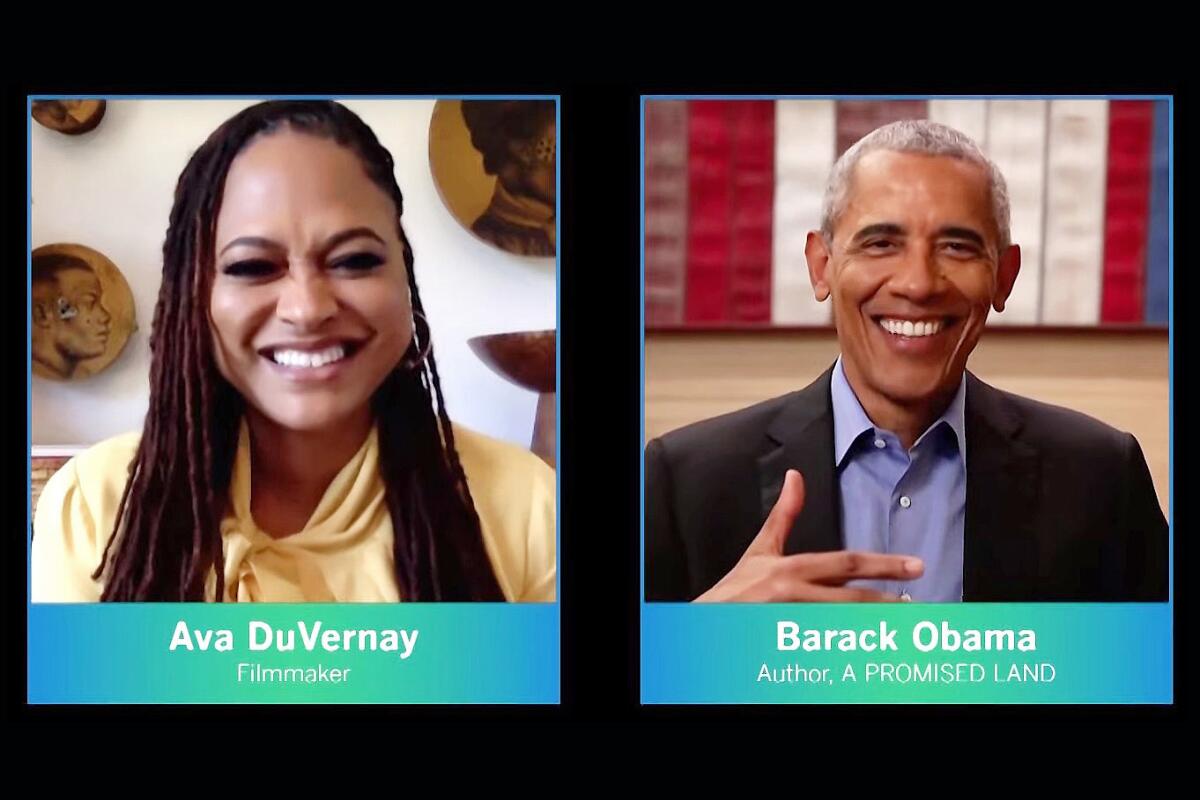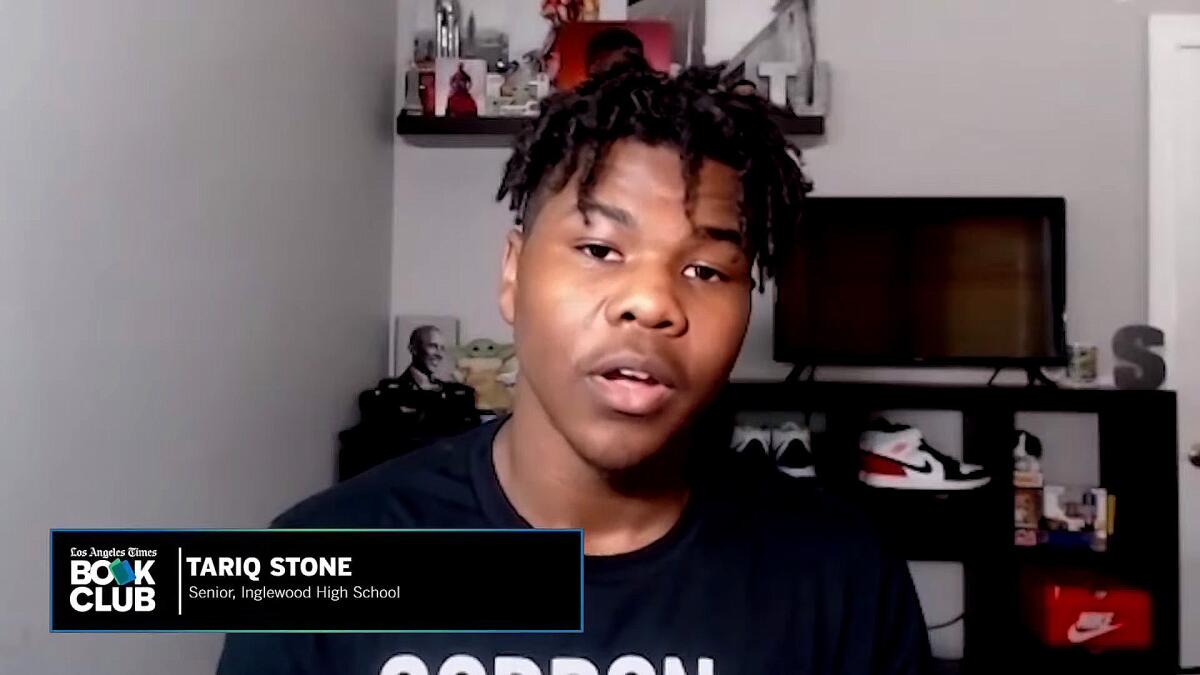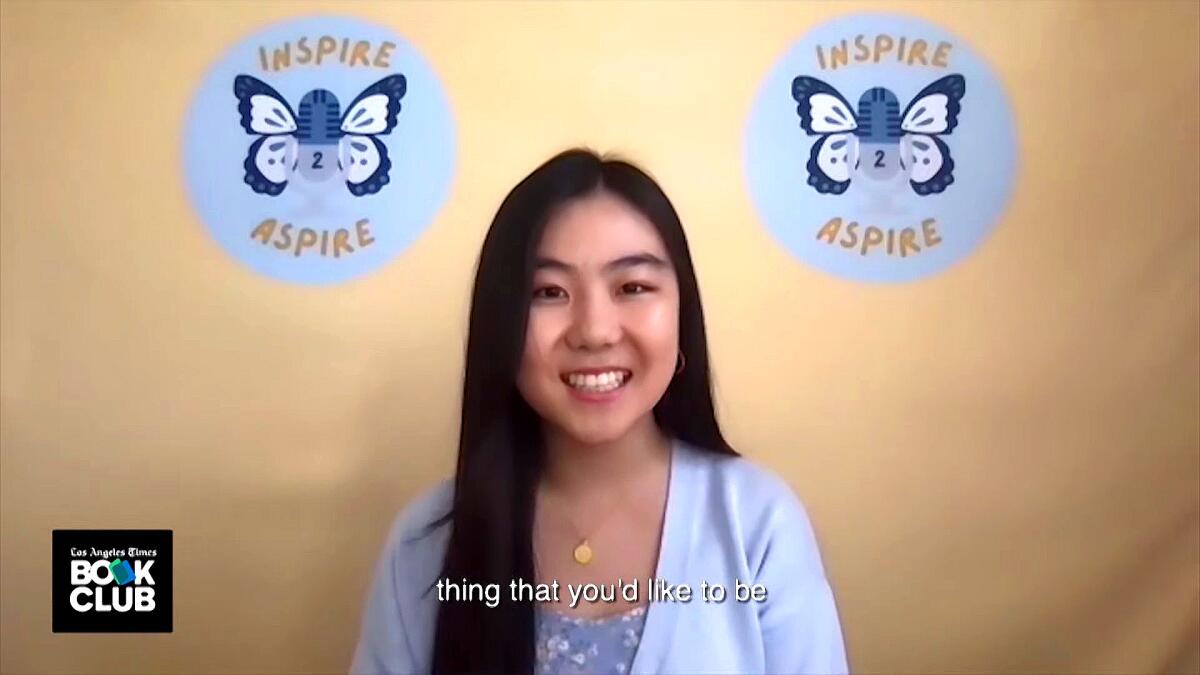Barack Obama has some advice for young activists: ‘Be clear and strategic’

- Share via
According to former President Obama, police reform begins with reimagining the role of law enforcement.
“What does it mean for a community to be safe?” Obama asked during a Los Angeles Times Book Club conversation that aired Wednesday. “For most of our history, policing in the African American community has meant just keeping a lid on things and keeping control and maintaining barriers and boundaries rather than actually serving those communities.”
The 44th president was joined by filmmaker Ava DuVernay (“Selma,” “A Wrinkle in Time”) for a talk about his bestselling memoir, “A Promised Land,” which tells the story of Obama’s journey from a young man with political aspirations to the watershed moments of his first presidential term.
The conversation was recorded April 15, five days before Derek Chauvin was found guilty of murder for the death of George Floyd. But it was a timely remark.
“A Promised Land,” out Tuesday in a worldwide release, eloquently and ruefully documents the first two and a half years of Obama’s presidency.
In discussing police reform as well as broader issues of activism and racial justice, the former POTUS acknowledged “I am no longer the young upstart,” but as someone who “ran my stage of the race” he still had some advice that might be worth heeding.
Obama reminded viewers that most criminal and law enforcement issues are determined at the state and local rather than federal level. It’s important to vote in local races, he said, and to be “clear and strategic” about who is a state or a district attorney.
“They’re the ones who are going to decide whether or not to prosecute a police officer who’s used excessive force,” Obama said. “Who’s writing the collective bargaining agreement between the police union and that municipality? Because that will often determine what the rules are, in terms of training, accountability and so forth.”
The advice came in answer to a question from DuVernay about building on the work of one’s predecessors, based on a passage in “A Promised Land” in which Rev. Otis Moss Jr. described himself and other civil rights veterans as “the Moses generation” in contrast to Obama’s “Joshua generation.”
Former President Barack Obama and filmmaker Ava DuVernay discuss “A Promised Land” at the L.A. Times Community Book Club.
“Perhaps you can learn from some of our mistakes,” Moss had told him. “But ultimately it will be up to you, with God’s help, to build on what we’ve done.”
Obama’s second piece of advice to activists? Frame issues in ways that appeal to broader coalitions.
“If we are going to change in fundamental ways how policing operates in this country in most jurisdictions that are not Black or brown, you are going to need to persuade people who aren’t reading James Baldwin and don’t plan to,” he said. “You’re going to have to persuade them that this is the right thing to do.”
During the event, two local high school students were invited to ask the former POTUS a question.

Tariq Stone, a senior at Inglewood High School, wanted to know what the most important step is in bridging the rifts dividing the nation.
“I don’t think that you are ever going to completely overcome our differences,” Obama began. “We are a big, complicated, noisy, multiracial, multiethnic, multireligious democracy. And that’s part of what sets America apart as this great experiment.”
Don Lemon talked about his book on race, “This is the Fire,” in a Times Festival of Books panel that was cut short by the Chauvin verdict announcement.
But he did offer a few suggestions. “One thing that I think we can do is work to see each other’s humanity and understand that we all are deserving of dignity and respect and that we all can abide by a certain process for resolving those differences.”
He also stressed the value of actively listening and learning about people’s histories. He credited that technique with helping him win the Democratic caucuses in Iowa, a “heavily white rural state” with “very few folks who looked like me,” when he was running for his first presidential term.
A diverse group of young organizers — Black, Jewish, Asian — planted themselves in small Iowa towns asking residents what was important to them, what issues frustrated them, and how the government had let them down.
That listening created bonds and trust, he recalled, “and it’s on the basis of that trust that people started listening to what I stood for.”

Grace Lee, a junior at Buena Park High School, asked: “What is the one thing that you’d like to be remembered for?”
Obama said it was difficult to say just yet. “It’s hard to get the kind of distance you need for perspective because part of what we have to do is to sit back and see: How’s this all going to play out? And that I may not know for another 20 years.”
But if he had to choose, he hopes he modeled a message of inclusion and showed how to tackle pressing problems without scandal or self-interest.
And he’s proud to have inspired young activists to confront issues like climate change and systemic racism.
“When you see people picking up the baton and doing great work and you think, ‘All right, maybe I sparked some of that,’ — that feels pretty good.”
Former President Obama joins the L.A. Times Community Book Club April 21 to discuss “A Promised Land” with filmmaker Ava DuVernay.
More to Read
Sign up for our Book Club newsletter
Get the latest news, events and more from the Los Angeles Times Book Club, and help us get L.A. reading and talking.
You may occasionally receive promotional content from the Los Angeles Times.








